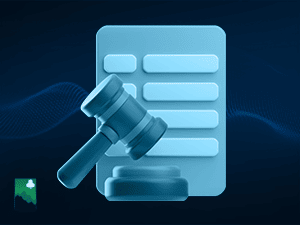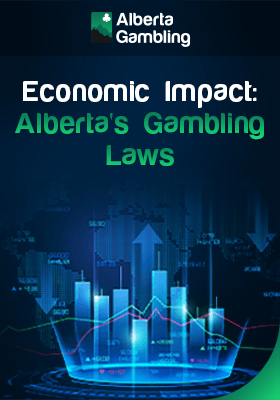Navigating the Legal Landscape of Gambling in Alberta: A Detailed Guide
Gambling has been an important part of society for centuries, often sparking different opinions, debates, and policies. In Alberta, the conversation around casinos has been no different. The province has seen shifts and transformations in gambling policies, resonating with both fans and critics.

Historical Coverage of Casino Gambling in Alberta
While gambling has deep roots in Alberta, its recognition, regulation, and reception have witnessed several shifts over the decades.

The Early Days and Attitudes Towards Gambling
The establishment of gambling in Alberta was characterized by a sense of anticipation, risk, and a degree of skepticism.
Several factors influenced the early attitudes and perspectives:
- Alberta's Early Gambling Industry: During the 1910s and 1920s, card games and betting, though popular, often found themselves linked with illegal establishments.
- Public Perception: Many early Albertans considered gambling synonymous with crime, corruption, and moral decay. Over time, especially by the mid-20th century, this perspective started to shift, with the region recognizing the potential revenue streams, particularly from lotteries.
Key Milestones:
- 1969 saw a great change with the amendment of the Criminal Code of Canada, permitting provinces like Alberta to have a say in regulating lotteries and casinos.
- By 1975, Alberta witnessed the establishment of its first not-for-profit casino in Edmonton, courtesy of a service club.

Legalization Process and Initial Regulations
The development of formal legislation for gaming in Alberta has been characterized by a methodical approach, to establish a regulated, safe, and well-organized environment for this activity.
- Governing Bodies:The Alberta Gaming Control Board set up in 1969, was instrumental in streamlining the early activities.
- Evolutionary Steps:The "Great Alberta Million Dollar Lottery" in 1974 was a significant landmark, positioning lotteries as revenue generators for public projects. The 1980s, characterized by the introduction of legalized horse racing, off-track betting, and charitable casinos, further fortified the province's casino infrastructure.

Evolution of Gambling Laws in Alberta
Gambling regulations in this region have been anything but stagnant. These laws' continuous adaptation and refinement can be attributed to changing societal needs, technological advancements, and economic priorities.
- Regulatory Framework: The Gaming and Liquor Act of 2001 provided a solid foundation, overseeing casinos, charitable gaming events, and lotteries within AB.
- Digital Era: The 2000s saw this province embracing digital trends, launching its online lottery platform in 2005 and starting discussions around online casino regulations by 2015.
- Recent Amendments: Bill C-218 in 2019, permitting single-event sports betting, hinted at the province’s openness to diversify its betting offerings, aligning with federal regulations.
Over the decades, the state’s approach to this activity has evolved from mere tolerance to strategic integration, always with an eye on societal well-being and economic prosperity.

Current Legal Status of Gambling in Alberta
In recent years, the casino industry in this jurisdiction has witnessed significant evolution. With the blend of traditional games and the introduction of digital platforms, AB Gambling Legality has had to adapt to these shifts.
Governing Bodies and Regulatory Entities
Several governing bodies and regulatory entities are important to the functioning of this activity. Their primary aim is to ensure that all gaming activities adhere to established regulations while prioritizing the interests of Albertans.
Alberta Gaming, Liquor, and Cannabis Commission (AGLC):
The Alberta Gaming, Liquor, and Cannabis Commission is the primary regulatory authority overseeing gambling, liquor, and cannabis within Alberta. The AGLC is responsible for licensing and regulating various entertainment venues such as casinos, lotteries, and video lottery terminals (VLTs). The commission plays an important role in enforcing responsible betting practices, ensuring that all gambling entities adhere strictly to the set laws and guidelines.
Alberta Gaming Research Institute (AGRI):
The Alberta Gaming Research Institute operates as an independent body, emphasizing research related to this activity and associated societal issues. In its mission to promote responsible behaviours, the AGRI collaborates closely with the AGLC. This partnership also aids in delivering evidence-based policy recommendations that influence the casino industry in Canada.
Alberta Gaming Research Council (AGRC):
The Alberta Gaming Research Council works with the AGLC. Its main objectives include suggesting research directions and devising responsible gambling strategies. Furthermore, the AGRC is instrumental in conceptualizing and executing the public.
Detailed Look into Alberta's Gambling Legislation
The Alberta Gaming, Liquor, and Cannabis Act stands at the lead of the region’s legislation on gambling.
It's provisions:
- The act governs not just wagering but also liquor and cannabis-related activities
- The AGLC, established under this act, oversees and regulates these activities
- Licensing, operation, and regulations of casinos ensure they function fairly and responsibly
The core objective of this legislation is to maintain a balance. While providing entertainment venues for Albertans, it's importantto protect the public, uphold integrity, and reduce the negative social implications of this activity.
Legal Age and Restrictions
The country’s laws dictate clear age restrictions and boundaries regarding gambling.
- Individuals must be at least 18 years old to engage in casino gaming activities and horse racing.
- For horse racing, while betting is permissible at 18. However, certain racetrack areas may impose stricter age restrictions.
- As for online casinos, while regulations may vary, the legal age is generally consistent with other forms at 18 years old.
- Regulatory bodies, operators, and relevant authorities ensure compliance with these age restrictions
Safety Measures and Legal Protections
This Canadian region has instituted several processes to ensure that gambling remains safe and enjoyable for its residents:
- Education: Casinos are legally mandated to educate their patrons about the potential risks and harms of excessive playing
- Age and Identity Verification: Strict verification processes confirm the age and identity of customers
- Self-Exclusion Programs: Allow players to restrict their access to casino activities for predetermined durations voluntarily
- Responsible Advertising: Misleading advertisements are prohibited, and advertisements focus on the entertainment value without glamorizing gaming
- Player Support and Assistance: Casinos offer helplines and on-site support for players in need, creating a confidential environment to address concerns
Offline vs. Online Gambling Laws in Alberta
The province’s laws differentiate between offline (land-based) and online casinos, primarily due to the unique challenges posed by digitilization.

Offline (Land-Based) Casinos
The Alberta Gaming, Liquor, and Cannabis Act primarily governs the framework for offline or land-based casinos. All operators seeking to provide such services must obtain licenses from the Alberta Gaming, Liquor, and Cannabis Commission (AGLC). An important emphasis is laid on promoting responsible behaviours.

Online Casinos
The regulations governing online casino play differ somewhat due to the borderless nature of the internet. Although age restrictions align with the general legal requirement of participants being at least 18, online platforms may implement various tools to encourage responsible behavior. These tools can include features like deposit limits and self-exclusion options, all designed to prioritize player safety.
The enactment of Bill C-218 was an important step to counteract the growing iGaming grey market. Before this, a considerable number of Canadians were accessing offshore casinos. The primary objective of the new regulations is to channel this revenue back into Canada. Given these shifts, brick-and-mortar casinos are now seeking opportunities for online expansion.

Types of Legal Gambling
In Canada, gambling has a rich history spanning decades, and with the evolution of AB Gambling Regulations, the province now offers diverse wagering options.
Land-Based Casinos and Gaming Facilities
Alberta, located in the centre of Canada, is not just popular for its Rockies and rich oil reserves. It also stands out as a great hub for gaming fans, showcasing a wide range of gambling venues and different playing options.
The province’s gaming industry has significantly transformed since the first permanent, privately-owned casino opened in Calgary in 1980. The following year saw another addition in Edmonton. These paved the way for the growth of brick-and-mortar casinos across the province.
Here's an overview of what the Alberta gaming industry includes:
- Alberta is home to a total of 28 licensed casinos
- Among these establishments, 24 can be described as Vegas-style casinos, whereas the remaining four are venues that focus predominantly on machine-based gaming.
- The bustling cities of Edmonton and Calgary mainly house most of these gaming establishments.
- Further amplifying its gaming credentials, the province features approximately 6,000 video lottery terminals (VLTs) strategically distributed across over 1,200 venues.
- In addition to casinos and VLTs, Alberta hosts over 25 bingo halls, over 80 keno facilities, and more than 2,500 ticket lottery centers.
- These venues offer diverse games, ranging from slots, VLTs, roulette, blackjack, poker, baccarat, red dog, craps, sic bo, to the intriguing pai gow tiles. Notably, it's worth mentioning that electronic gaming machines in the province, especially VLTs and slots, are mandated by Alberta's strict regulations to maintain a generous 92% payout rate.
Sports Betting and Fantasy Sports
Within the gambling industry, sports betting and fantasy sports have successfully created a niche for themselves. These gambling options are carefully governed by regulations that highlight the principles of fairness, transparency, and participant protection.
To ensure responsible participation, individuals wishing to engage in fantasy sports must be at least 18 years of age. Additionally, both the prize pools and entry fees associated with fantasy sports contests are subject to strict monitoring, a move aimed at reducing any potential exploitation.
Expansion of BetMGM and FanDuel in Alberta
BetMGM is progressively establishing its dominance in Alberta on the sports betting front. This expansion strategy is boosted by its already excellent reputation across North America. Meanwhile, FanDuel, which began as a daily fantasy sports platform, is now offering online casino games and sportsbook betting.
Horse Racing and Off-Track Betting
The Alberta Horse Racing Act governs horse racing and off-track betting as the primary regulatory authority.
Esteemed tracks such as the Century Mile Racetrack and Casino, Rocky Mountain Turf Club, and Alberta Downs have consistently attracted considerable crowds during their respective racing seasons.
For those fans unable to attend the live races, Off-Track Betting (OTB) venues have emerged as a popular alternative. These venues, including casinos and other sanctioned locations, allow for distant wagers on races. Notably, the Century Mile has emerged as a successor to Northlands Park and today stands as a comprehensive facility that offers live horse racing, OTB, and a casino filled with different gaming experiences.
Lotteries and Bingo
In Alberta, the Alberta Gaming, Liquor, and Cannabis Act is the guiding framework for regulating lotteries and bingo. Under its supervision, the AGLC works diligently to ensure legal compliance across these gaming activities. With their large jackpots, lotteries have become popular in the province, attracting widespread interest from residents.
On the other hand, bingo, a game which reflects fairness and responsible gaming, is mainly organized by charity and nonprofit organizations. The beauty of these charitable bingo sessions lies in their noble intent, as they channel their proceeds to fund various community projects and charitable causes.

Impact of Gambling Laws on Alberta's Economy
The move towards expanding gambling for economic development might initially seem promising, but it holds potential consequences for the province’s long-term economic health. As more capital is funneled into new ventures, other business sectors might suffer, facing reduced investments.
Consequently, as consumers spend more on betting and wagering, other businesses could see a decline in revenues, leading to potential job losses and other associated economic challenges. Additionally, with the rise of Responsible Gambling, there's an increasing focus on the socio-economic costs incurred due to serious issues within the population.
Revenue Generation from Gambling Activities
Looking at the Canadian casino sector, one finds varying contributions to the economy based on the different aspects of this industry. Here, we will explore the details of these contributions, how the revenue generated is distributed, and highlight recent trends and patterns in the Canadian gaming industry.
- Different Contribution Levels: Various aspects of the gambling sector contribute differently to Alberta's economy. Land-based casinos, for instance, generate significant revenue from activities like slot machines, table games, and poker. On the other hand, lotteries, ranging from instant win games to raffles, boost the economy through ticket sales, with major ones offering sizable jackpots, thus driving higher ticket sales.
- Revenue Distribution: The revenue from gambling isn't just limited to immediate activities. It also includes gaming taxes, licensing fees, and other streams that ultimately go into the government's coffers. Notably, a large portion of the lottery proceeds assists the provincial government in supporting public services and programs.
- Trends and Patterns: Gambling revenue in this region increased in 2018, growing by $4 million, amounting to $1.736 billion, primarily driven by video terminals. This contrasts with the slight decline in previous years, explains the economy and its influence on gambling.
Job Creation and Economic Growth
The casino industry plays an important role in the Alberta employment sector.
- Employment Statistics: The casino industry has been a major employment driver. With 43,342 jobs linked to the sector, it includes direct employment in casino establishments, roles in related government and charity entities, and positions that cater to the needs of the casino industry.
- Wider Economic Impact: The job opportunities created aren't limited to direct employment. The horse racing sector, for instance, offers jobs in race management, horse care, and event operations, thereby indirectly supporting the provincial economy.
Impact on the Tourism Industry
Alberta's casino industry uniquely combines wagering with broader entertainment experiences, showcasing tourism attractions and strategic partnerships that enrich the region.
- Integrated Resort Complexes: Many casinos aren't standalone entities. They're part of broader resort complexes offering many amenities like hotels, eateries, entertainment venues, and shopping areas. Such integrated resorts appeal to tourists seeking a comprehensive entertainment experience beyond gambling.
- Attracting Tourists: Certain casinos and gaming facilities have emerged as major attractions in their respective locales. Tourists don't just visit to play; they are often keen on exploring the wider tourism offerings of the region.
- Synergies and Partnerships: Casinos frequently organize events, concerts, and shows, attracting locals and outsiders. Such events boost the tourism appeal of a location, motivating tourists to prolong their stay.

Comparing Alberta's Gambling Laws to Other Provinces
Given the province's unique position within Canada's broad legislative sector, gambling legality in Alberta is a subject of interest.
Ontario vs. Alberta: A Comparative Analysis
Ontario and Alberta are two major provinces in Canada with significant contrasts in their gambling sectors.

Legal Age
Ontario, along with regions like British Columbia and Saskatchewan, requires individuals to be 19 years of age to partake in casinos. In contrast, Alberta has a legal age of 18, making it more lenient in this respect.

Licensing and Regulation
In Ontario, the Alcohol and Gaming Commission of Ontario, alongside the Ontario Lottery and Gaming Corporation, regulates the casino industry. This region is characterized by its liberal stance, underlined by regulations such as the Gaming Control Act of 1992 and the Ontario Lottery and Gaming Corporation 1999. With the introduction of the iGaming market, online casino accessibility has improved considerably.
On the other hand, this jurisdiction has the Alberta Gaming, Liquor & Cannabis Commission in charge. They permit only charitable and religious organizations to register as gambling service providers. The primary legislation guiding entities here is the Gaming, Liquor, and Cannabis Act. Moreover, this province hosts only one regulated online casino site, PlayAlberta.ca.

Notable Contrasts
While Alberta ensures that money played within its borders remains there through Play Alberta, Ontario has broadened its horizon by collaborating with the Alcohol and Gaming Commission of Ontario to introduce a new online gaming market with private companies.
Quebec's Unique Stance on Gambling
Quebec has always played along in matters of gambling regulation.
- Distinctive Regulations: Quebec's concerns about online casinos were evident as early as 2000. By 2010, the government revealed its intention to introduce a public online casino offering via Loto-Québec, resulting in the birth of Espacejeux, a regulated platform. This move aimed at providing a legal and secure space for gamblers, thereby addressing the province's concerns about residents engaging in this activity on out-of-jurisdiction sites.
- Legal Implications: In a landmark 2018 judgment, Quebec's Superior Court struck down a section, citing its intrusion into federal jurisdiction. However, the possibility of an appeal remains open, awaiting further deliberations by the Court of Appeal of Quebec.
How Alberta's Legislation Stands Out:
Alberta's approach to gambling legislation includes distinctive features compared to other provinces.
- Online Casino Scenario: While online casinos became legal in Canada in 1996, Alberta has its unique set of rules. Governed by the Alberta Gaming, Liquor, and Cannabis Commission, the province regulates both online and land-based establishments. Unlike other regions where the age is 19, the AB minimum age is 18.
- Unique Offerings: PlayAlberta.ca, established by NeoPollard Interactive, stands as the sole licensed and regulated casino platform. From slots and table games to video poker and scratch cards, it has increased its offerings to include sports betting as of September 2021.
- Potential Impact: Alberta’s progressive stance on the gambling age and the exclusivity of PlayAlberta.ca promise a unique environment for gamblers within its boundaries. The province's leniency in permitting residents to use offshore online casinos and sportsbooks, even if they're registered outside Canada, could have ripple effects on the casino industry in the future.

Online Casinos: Global Context
Online casinos has experienced significant growth and transformation in recent years. With technology pushing this evolution and the allure of convenient gaming, jurisdictions worldwide have struggled to regulate and monitor this industry.
Growth of Online Casinos: A Global Perspective
Over the past ten years, the casino industry has been radically transformed by the increase ofonline casinos in Alberta. This shift has been pushed by rapid advancements in digital technology, widespread adoption of smartphones, and evolving consumer behaviours.
In 2021 alone, the Canadian casino sector generated $2.64 billion in revenue. A considerable amount, close to $1.2 billion, was attributed to online casino platforms. Looking at global records, the market is diversifying at an impressive rate.
The Canadian online casino industry's growth attracts offshore investors, underscoring its potential. However, it faces challenges internationally, including addressing problem gambling, promoting responsible play, and navigating complex regulations.
Several trends have been observed on a global scale:
- A shift in marketing approaches, emphasizing responsible playing, offering tools for users to manage their behaviour, and imposing stricter age restrictions
- An increase in live dealer games enhances players' interactive and immersive experience
- The emergence and rising popularity of crypto casinos allow for more secure, private, and fast transactions
- An increase in esports betting, capitalizing on the dynamic and interactive nature of online gaming
Alberta's Approach to Online Gambling
Alberta's approach to regulating online casinos aligns with Canada's perspective, emphasizing that gaming activities are only allowed when supervised by provincial bodies. Specifically in AB, registering as a casino is reserved exclusively for charity and religious organizations.
They operate under the watchful eyes of the Alberta Gaming, Liquor, and Cannabis Commission. This Canadian region also claims PlayAlberta.ca, its sole regulated online casino website. Any operators keen on offering their services must abide by the Gaming, Liquor, and Cannabis Act. Here, nearly all forms of gambling - lotteries, raffles, sports betting, bingo, or online casinos - are legal.
Unique Features of Alberta's Gambling Industry
Much of the revenue generated from gambling is channelled toward charity initiatives.
This money goes into the General Revenue Fund, from where it's strategically disbursed to a variety of charity organizations. Further highlighting the love for this activity, statistics reveal that over 80% of its adult citizens participate in betting annually. This widespread participation grows an industry that generates 23 billion dollars annually.
Regulations for Online Casino Operators
For operators seeking to venture into the online casino market, strict regulations have been laid out:
- Operators must secure licensing from the Alberta Gaming, Liquor, and Cannabis Commission
- Player protection measures, responsible playing initiatives, and transparency in game operations are important
- Advisory committees scrutinize online game development, ensuring alignment with regulatory requirements
- Non-compliance can result in penalties, making it important for operators to stay abreast of all regulations
Popular Online Casino Platforms
Residents in Alberta have access to a selection of top-tier online casino platforms:
Top 5 Online Casinos:
- Lucky Spins Casino: Renowned for slot machines
- Club Riches Casino: Known for bonuses and promotions
- Hellspin Casino: A favourite for new online game offerings
- Platin Casino: Preferred for live dealer games
- Neon54 Casino: Popular for jackpot slots
These platforms are popular, licensed and regulated, ensuring that their operations align with market standards and regulatory requirements.
Future Prospects for Online Gambling in Alberta
The future of online gambling in this province appears promising, with potential avenues for growth and evolution:
- Continued integration of technology, with AI and VR, possibly reshaping the online gambling experience
- Regulatory reforms may further open the market, attracting more international investors and increasing the gaming offerings
- Increased emphasis on responsible gambling, ensuring players have tools and resources to manage their playing habits
- Given the global trends, it's conceivable that Alberta will see further adoption of crypto casinos and an increase in esports betting
Conclusion
In summary, Alberta's gambling history has seen significant transformations, reflecting changing perspectives, regulations, and technological advancements. From initial skepticism to the current status as a revenue source through lotteries and more recently, single-event sports betting, the province has strategically adapted its approach. These shifts have impacted Alberta's economy positively by creating jobs and boosting tourism and the future holds potential for further technological advancements and regulatory reforms in the online gambling industry.
FAQ
- What are the main gambling laws in Alberta? These laws in Alberta are the Gaming, Liquor, and Cannabis Act, overseen by the Alberta Gaming, Liquor, and Cannabis Commission (AGLC).
- How has the legal landscape of gambling in AB changed over time? Over time, the province has transitioned from restrictive gambling regulations to a more open and structured approach, introducing licensed online platforms and expanding the range of allowed activities in this field.
- How do Alberta's gambling laws compare to those in other provinces? While all Canadian provinces have their own set of regulations, the province's laws are relatively flexible, allowing a wider range of gambling activities, though still under stringent oversight.
- What impact does gambling have on Alberta's economy? This activity significantly contributes to Alberta's economy, raising over 23 billion dollars annually, with a substantial portion funding charitable organizations.
- What measures are in place to combat problems in Alberta? Alberta promotes responsible playing with initiatives like age restrictions, player protection measures, self-exclusion options, and awareness campaigns to aid those facing gambling-related issues.